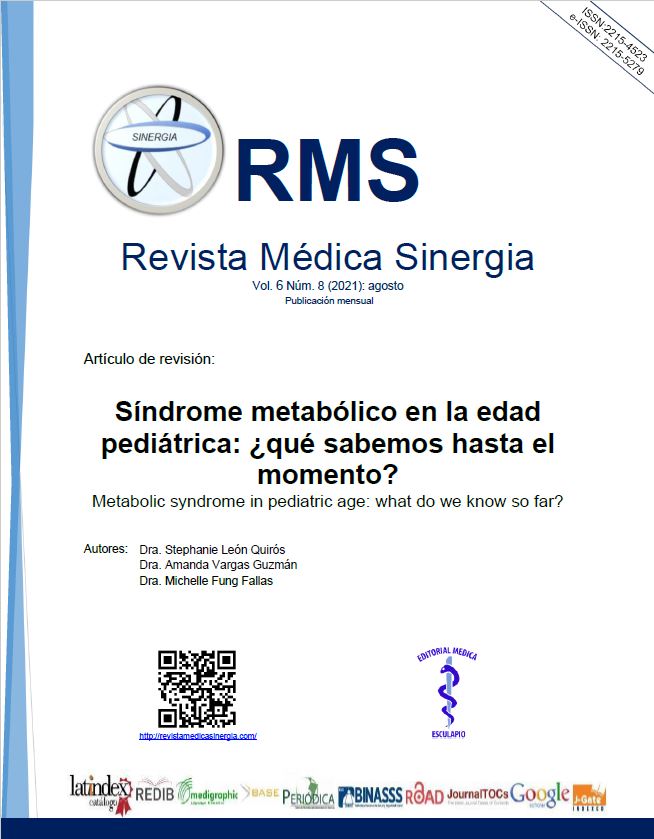Abstract
The metabolic syndrome represents a challenge for public health, since it generates an increase in morbidity and mortality in the population and its prevalence is increasing at all ages. It is due to a complex interaction between genetic, behavioral and environmental factors whose harmful effects on the physical health of the individual have been shown to start their affectation from intrauterine life and remain until adulthood. It is a diagnostic challenge in pediatric age, due to lack of consensus in its definition and diagnostic criteria. Regarding the approach, it also poses a challenge due to the multiple factors to be treated, however, the importance of promoting prevention in the first place has been demonstrated, since the younger age and the less advance of the harmful effects, the greater benefit obtained. For this, parents and children are trained to follow healthy habits of physical activity, sleep patterns, breastfeeding and subsequently a healthy diet. There are also options aimed at treating those who already suffer from it, and one of the strategies with the best results is the use of cognitive-behavioral therapy, but in turn there are more objects of study for the future.
Keywords
References
Miri SF, Javadi M, Lin C-Y, Griffiths MD, Björk M, Pakpour AH. Effectiveness of cognitive-behavioral therapy on nutrition improvement and weight of overweight and obese adolescents: A randomized controlled trial. Diabetes Metab Syndr. 2019;13(3):2190–7.
García AG, Urbina Treviño MV, Villalpando Sánchez DC, Aguilar CA. Diagnostic accuracy of triglyceride/glucose and triglyceride/HDL index as predictors for insulin resistance in children with and without obesity. Diabetes Metab Syndr. 2019;13(4):2329–34.
Hirschler V, Oestreicher K, Maccallini G, Aranda C. Relationship between obesity and metabolic syndrome among Argentinean elementary school children. Clin Biochem. 2010;43(4–5):435–41.
Wong-McClure RA, Gregg EW, Barceló A, Lee K, Abarca-Gómez L, Sanabria-López L, et al. Prevalence of metabolic syndrome in Central America: a cross-sectional population-based study. Rev Panam Salud Publica. 2015;38(3):202–8.
Peña-Espinoza BI, Granados-Silvestre M de LÁ, Sánchez-Pozos K, Ortiz-López MG, Menjivar M. Metabolic syndrome in Mexican children: Low effectiveness of diagnostic definitions. Endocrinol Diabetes Nutr (Engl ). 2017;64(7):369–76.
Ahrens W, Moreno LA, Mårild S, Molnár D, Siani A, De Henauw S, et al. Metabolic syndrome in young children: definitions and results of the IDEFICS study. Int J Obes (Lond). 2014;38 Suppl 2(S2):S4-14.
Zhang J-S, Gui Z-H, Zou Z-Y, Yang B-Y, Ma J, Jing J, et al. Long-term exposure to ambient air pollution and metabolic syndrome in children and adolescents: A national cross-sectional study in China. Environ Int. 2021;148(106383):106383.
Katsa ME, Ioannidis A, Zyga S, Tsironi M, Koutsovitis P, Chatzipanagiotou S, et al. The effect of nutrition and sleep habits on predisposition for Metabolic Syndrome in Greek children. J Pediatr Nurs. 2018;40:e2–8.
Formisano A, Bammann K, Fraterman A, Hadjigeorgiou C, Herrmann D, Iacoviello L, et al. Efficacy of neck circumference to identify metabolic syndrome in 3-10 year-old European children: Results from IDEFICS study. Nutr Metab Cardiovasc Dis. 2016;26(6):510–6.
Duan Y, Sun J, Wang M, Zhao M, Magnussen CG, Xi B. Association between short sleep duration and metabolic syndrome in Chinese children and adolescents. Sleep Med. 2020;74:343–8.
Iguacel I, Michels N, Ahrens W, Bammann K, Eiben G, Fernández-Alvira JM, et al. Prospective associations between socioeconomically disadvantaged groups and metabolic syndrome risk in European children. Results from the IDEFICS study. Int J Cardiol. 2018;272:333–40.
Orr CJ, Ben-Davies M, Ravanbakht SN, Yin HS, Sanders LM, Rothman RL, et al. Parental feeding beliefs and practices and household food insecurity in infancy. Acad Pediatr. 2019;19(1):80–9.
Bélanger M, Dugas C, Perron J, Ruchat S-M, Weisnagel SJ, Marc I, et al. Association between lifestyle habits and adiposity values among children exposed and unexposed to gestational diabetes mellitus in utero. Diabetes Metab Syndr. 2019;13(5):2947–52.
Wood CT, Witt WP, Skinner AC, Yin HS, Rothman RL, Sanders LM, et al. Effects of breastfeeding, formula feeding, and complementary feeding on rapid weight gain in the first year of life. Acad Pediatr. 2021;21(2):288–96.
Fazeli M, Mohammad-Zadeh M, Darroudi S, Meshkat Z, Moslem A, Ghazizadeh H, et al. New anthropometric indices in the definition of metabolic syndrome in pediatrics. Diabetes Metab Syndr. 2019;13(3):1779–84.
Flynn JT, Kaelber DC, Baker-Smith CM, et al. Clinical Practice Guideline for Screening and Management of High Blood Pressure in Children and Adolescents. Pediatrics. 2017;140(3):e20171904.
Alliu M K-L, Bertoglia A MP. Evaluación del screening de perfil lipídico propuesto por la Academia Americana de Pediatría. Rev Chil Pediatr. 2012;83(3):231–8.
Ritchie SK, Murphy EC-S, Ice C, Cottrell LA, Minor V, Elliott E, et al. Universal versus targeted blood cholesterol screening among youth: The CARDIAC project. Pediatrics. 2010;126(2):260–5.
AAP COMMITTEE ON PRACTICE AND AMBULATORY MEDICINE and AAP BRIGHT FUTURES PERIODICITY SCHEDULE WORKGROUP. 2017 Recommendations for Preventive Pediatric Health Care. Pediatrics. 2017;139(4):e20170254.
McCormick DP, Reyna L, Reifsnider E. Calories, caffeine and the onset of obesity in young children. Acad Pediatr. 2020;20(6):801–8.
Reifsnider E, McCormick DP, Cullen KW, Todd M, Moramarco MW, Gallagher MR, et al. Randomized controlled trial to prevent infant overweight in a high-risk population. Acad Pediatr. 2018;18(3):324–33.
Martino F, Puddu PE, Lamacchia F, Colantoni C, Zanoni C, Barillà F, et al. Mediterranean diet and physical activity impact on metabolic syndrome among children and adolescents from Southern Italy: Contribution from the Calabrian Sierras Community Study (CSCS). Int J Cardiol. 2016;225:284–8.

This work is licensed under a Creative Commons Attribution-NonCommercial 4.0 International License.
Copyright (c) 2021 Array


